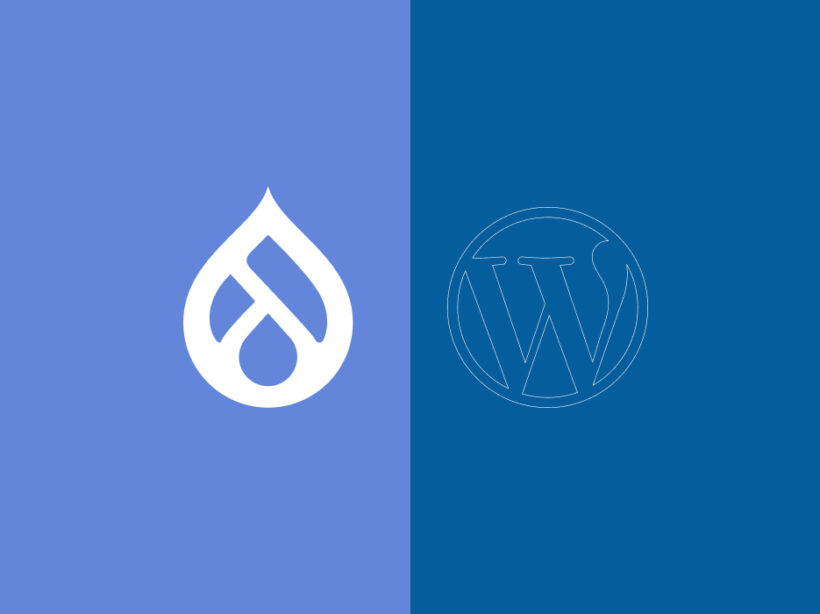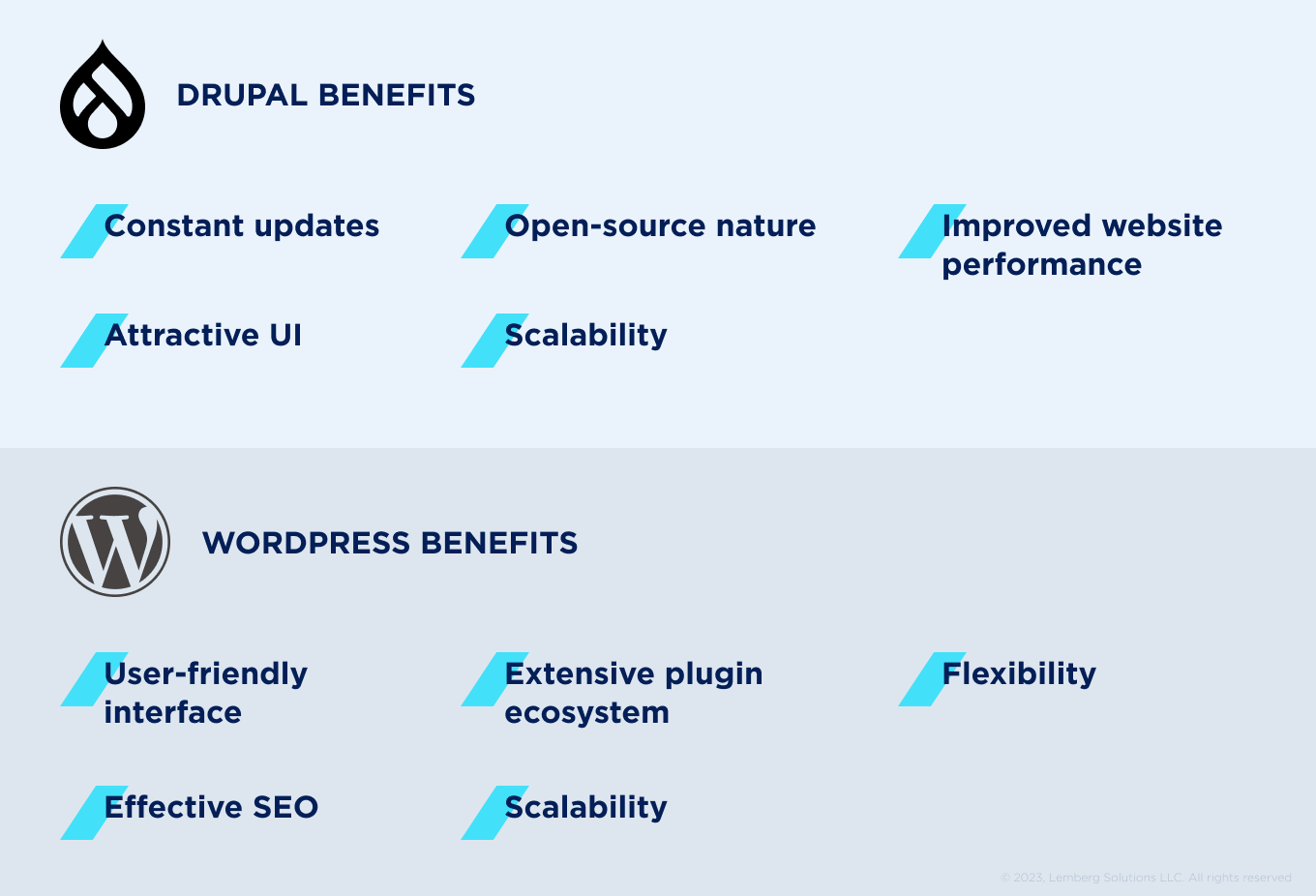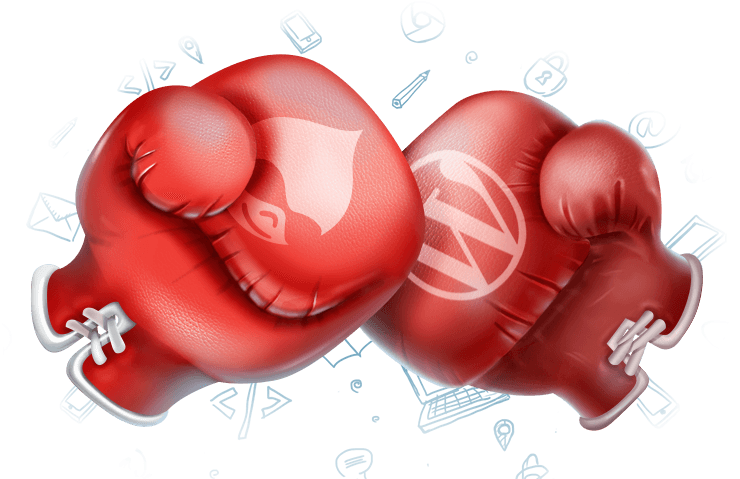Drupal is ideal for complex, large-scale websites requiring customization. WordPress suits simpler, more user-friendly, and content-focused websites.
Choosing the right CMS can significantly impact your website’s functionality and user experience. Drupal and WordPress dominate the market, each offering unique advantages. Drupal excels in handling complex, large-scale websites with extensive customization needs. It provides robust security and flexibility, making it suitable for developers and enterprises.
WordPress, on the other hand, is known for its ease of use and extensive plugin ecosystem. It is perfect for smaller websites, blogs, and businesses seeking a user-friendly interface. Understanding the strengths and limitations of both platforms can help you make an informed decision tailored to your specific needs.

Drupal Overview
Drupal is a powerful and flexible content management system (CMS). It is an open-source platform, meaning it is free to use. Drupal is known for its high level of customization and scalability. Many large organizations and governments use Drupal for their websites.
Key Features
- Customization: Drupal offers extensive customization options. You can modify almost every aspect of your site.
- Modules: Thousands of modules extend Drupal’s core functionality. These modules can add features like forums, polls, and user blogs.
- Security: Drupal is known for its strong security measures. It has a dedicated team that regularly updates the platform.
- Multilingual Support: Drupal supports multiple languages out of the box. This makes it a great choice for global websites.
- Scalability: Drupal can handle high-traffic websites. It is suitable for both small blogs and large corporate sites.
Popular Use Cases
| Use Case | Description |
|---|---|
| Government Websites | Drupal is often used by government agencies for its security and scalability. |
| Educational Institutions | Schools and universities prefer Drupal for its flexibility and community features. |
| Corporate Websites | Many large companies use Drupal for its customization options and robust features. |
| Community Portals | Drupal is ideal for creating forums, social networks, and other community sites. |
WordPress Overview
WordPress is the world’s most popular Content Management System (CMS). It powers over 40% of all websites on the internet. Its user-friendly interface and flexibility make it a favorite among beginners and experts alike.
Key Features
- Ease of Use: WordPress is easy to install and set up. Its interface is intuitive and user-friendly.
- Customization: Thousands of themes and plugins are available. You can customize your site to meet your needs.
- SEO-Friendly: WordPress is built with SEO in mind. It has many SEO plugins to help you rank better.
- Responsive Design: Most WordPress themes are mobile-friendly. Your site will look great on any device.
- Community Support: A large community of users and developers can help you solve problems.
Popular Use Cases
| Use Case | Description |
|---|---|
| Blogging | WordPress started as a blogging platform. It remains the top choice for bloggers. |
| Business Websites | Many businesses use WordPress for their websites. It offers professional themes and plugins. |
| eCommerce | With plugins like WooCommerce, WordPress can power online stores. |
| Portfolios | Artists and photographers use WordPress to showcase their work. |
| Forums | Plugins like bbPress allow you to create forums and communities. |
Ease Of Use
Choosing a CMS with an easy-to-use interface can save you time and effort. Both Drupal and WordPress are popular, but their ease of use varies. This section will help you understand which one is more user-friendly for your needs.
Installation Process
WordPress is known for its quick and simple installation process. You can install it in just a few clicks. Most hosting providers offer one-click installations for WordPress. This makes it easy for beginners to get started.
Drupal also offers a straightforward installation process. However, it is slightly more complex than WordPress. You may need some technical knowledge to complete the installation. Many hosting providers do not offer one-click installations for Drupal.
| CMS | Installation Process |
|---|---|
| WordPress | Quick and simple, often with one-click install. |
| Drupal | Requires more steps and some technical skills. |
User Interface
WordPress has a user-friendly interface that is easy to navigate. The dashboard is intuitive, making it suitable for beginners. You can easily add posts, pages, and media with a few clicks.
Drupal offers a more complex user interface. It is powerful but less intuitive for beginners. The learning curve is steeper, but it offers more customization options. Experienced users may find it more flexible.
- WordPress:
- User-friendly dashboard
- Easy to add content
- Suitable for beginners
- Drupal:
- Complex interface
- Steeper learning curve
- More customization options
Customization Options
Choosing the right CMS is crucial for your website’s success. Customization options play a significant role in this decision. Let’s dive into the customization capabilities of Drupal and WordPress under different aspects.
Themes And Templates
Both Drupal and WordPress offer a wide range of themes and templates. These help you shape the look and feel of your website.
- WordPress: Offers thousands of free and premium themes. Easy to install and customize.
- Drupal: Provides fewer themes but offers greater flexibility. Ideal for complex designs.
WordPress themes are beginner-friendly. Drupal themes require more technical knowledge but provide deeper customization.
Plugins And Modules
Enhance your site’s functionality using plugins and modules. Both CMS platforms excel in this area.
| Feature | WordPress | Drupal |
|---|---|---|
| Number of Plugins/Modules | Over 50,000 plugins | Over 40,000 modules |
| Ease of Use | Very user-friendly | Requires coding knowledge |
| Customization Depth | Limited to plugin options | Highly customizable |
WordPress plugins are great for quick fixes. Drupal modules offer advanced customization.
In summary, both WordPress and Drupal provide robust customization options. Your choice depends on your needs and technical skills.
Security
Security is a top priority for any website owner. Choosing the right CMS can make a huge difference in protecting your site. Both Drupal and WordPress offer security features, but they vary in approach and depth.
Built-in Security Features
Drupal is known for its strong security focus. It has many built-in security features that help protect your site from attacks. Some of these features include:
- Access control
- Database encryption
- Security modules
These features provide a robust foundation for any website. Drupal’s security team also regularly updates the core software to fix vulnerabilities.
WordPress also offers security features, but they are often less comprehensive. Some of the built-in security features include:
- Password protection
- Automatic updates
- Two-factor authentication
WordPress relies heavily on third-party plugins for additional security. This can be both an advantage and a disadvantage.
Community Support
The community behind each CMS plays a crucial role in security. Drupal has a dedicated security team that actively monitors and addresses security issues. They provide regular updates and patches, ensuring your site stays secure.
The WordPress community is larger but more fragmented. Many developers create security plugins, which can be both a strength and a weakness. The variety of plugins means you have many options, but not all plugins are created equal. Some may have vulnerabilities themselves.
Below is a comparison table highlighting the main security aspects of Drupal and WordPress:
| Security Aspect | Drupal | WordPress |
|---|---|---|
| Built-in Security | High | Moderate |
| Community Support | Dedicated Security Team | Large, Fragmented Community |
| Third-Party Plugins | Fewer, More Secure | Many, Varied Quality |
Choosing between Drupal and WordPress for security depends on your needs. Drupal offers more built-in security features and a dedicated team. WordPress has a larger community but relies on plugins for enhanced security.

Performance
When choosing a CMS, performance is key. A website’s speed and ability to handle growth are crucial. Let’s compare Drupal and WordPress in terms of performance.
Speed And Efficiency
Speed affects user experience and SEO. Both Drupal and WordPress can be fast, but there are differences.
- WordPress is often faster out-of-the-box.
- Drupal may need more configuration for speed.
Both CMSs use caching to improve speed. WordPress has many plugins for caching. Drupal also has built-in caching mechanisms. To make both CMSs faster, use good hosting and CDN services.
Scalability
Scalability means how well a CMS handles growth. Both Drupal and WordPress scale well, but there are differences.
- Drupal is known for handling complex and large sites.
- WordPress can scale with the right plugins and hosting.
Drupal’s architecture is robust, making it suitable for enterprise-level projects. WordPress can also handle large sites but may need more optimization. Choose the CMS that fits your growth needs.
| Feature | WordPress | Drupal |
|---|---|---|
| Speed | Fast out-of-the-box | Needs configuration |
| Efficiency | Relies on plugins | Built-in caching |
| Scalability | Good with optimization | Handles large sites easily |
Both CMSs offer great performance. The choice depends on your specific needs.
Cost
Choosing between Drupal and WordPress often comes down to cost. Costs affect your budget and long-term investment. Let’s break down the costs for each CMS.
Initial Setup Costs
Initial setup costs can vary greatly between Drupal and WordPress. Both platforms offer free versions. But, their setup costs differ due to complexity and requirements.
| Cost Factor | Drupal | WordPress |
|---|---|---|
| Software | Free | Free |
| Hosting | $5-$100/month | $3-$50/month |
| Domain | $10-$15/year | $10-$15/year |
| Design | $500-$20,000 | $0-$5,000 |
| Plugins/Add-ons | $0-$1,000 | $0-$200 |
Drupal may require professional help for setup. This can increase initial costs. WordPress is easier for beginners. This reduces the need for professional help.
Ongoing Maintenance
Ongoing maintenance costs include updates, security, and support. These costs ensure your website runs smoothly.
- Drupal: Requires regular updates for security and functionality.
- WordPress: Also needs updates but is easier to manage.
Drupal’s complexity may require hiring a developer. This can increase maintenance costs. WordPress has a user-friendly interface. This reduces the need for external help.
Let’s compare the ongoing maintenance costs in a table:
| Cost Factor | Drupal | WordPress |
|---|---|---|
| Updates | $50-$200/month | $0-$50/month |
| Security | $50-$300/month | $0-$100/month |
| Support | $100-$1,000/month | $0-$500/month |
Choosing the right CMS depends on your budget and needs. Consider both initial setup and ongoing maintenance costs.

Community And Support
Choosing the right CMS means considering community and support. A strong support system helps solve issues quickly. Let’s compare Drupal and WordPress in this area.
Online Resources
Both Drupal and WordPress have extensive online resources available. These resources include forums, documentation, and tutorials.
| Platform | Forums | Documentation | Tutorials |
|---|---|---|---|
| Drupal | Drupal.org Forums | Comprehensive Official Docs | Community and Official Tutorials |
| WordPress | WordPress Support Forums | Detailed User Guides | Numerous Video Tutorials |
WordPress has a larger user base. This means more community-generated content. Drupal’s content is more technical and detailed. Both platforms offer valuable resources for learning and troubleshooting.
Professional Help
Sometimes, you need professional help. Both Drupal and WordPress offer options for hiring experts.
- Drupal: Specialists are available for complex projects. They are often more expensive.
- WordPress: Numerous freelance developers. They range from affordable to premium services.
Drupal developers are often found through specialized agencies. WordPress developers can be found on freelance platforms. Both communities have dedicated professionals ready to assist.
Both CMSs have active communities and professional help options. Choose based on your project’s complexity and budget.
Which Cms Is Right For You?
Choosing the right CMS can be challenging. There are many options, but two stand out: Drupal and WordPress. Each has its strengths. Which CMS suits your needs? Let’s explore.
Consider Your Needs
Before deciding, think about your requirements. WordPress is great for beginners. It is user-friendly and has many plugins. You can create blogs, portfolios, or small business websites easily.
Drupal is powerful. It is perfect for complex websites. It offers advanced features and customization. It is suitable for large organizations and developers.
| Criteria | WordPress | Drupal |
|---|---|---|
| Ease of Use | Easy | Challenging |
| Customization | Moderate | High |
| Security | Good | Excellent |
| Scalability | Medium | High |
Final Thoughts
WordPress is ideal for simple sites. Beginners love it. It is quick to set up and easy to manage. It has many themes and plugins.
Drupal is best for complex sites. It requires more knowledge. It offers greater flexibility and security. It is favored by developers and large organizations.
Assess your needs carefully. Choose the CMS that fits your goals. Whether WordPress or Drupal, each has unique strengths.
Frequently Asked Questions
What Is The Main Difference Between Drupal And WordPress?
Drupal is known for its flexibility and scalability. WordPress is user-friendly and ideal for beginners. Both have unique features suited to different needs.
Which Cms Is Better For Beginners?
WordPress is better for beginners due to its user-friendly interface. It has a vast library of themes and plugins, making it easy to use.
Is Drupal More Secure Than WordPress?
Yes, Drupal is generally considered more secure than WordPress. It has robust security modules and fewer vulnerabilities, making it ideal for complex sites.
Can I Migrate From WordPress To Drupal?
Yes, you can migrate from WordPress to Drupal. There are tools and services available to help with the migration process, ensuring a smooth transition.
Conclusion
Choosing between Drupal and WordPress depends on your needs. WordPress is user-friendly and great for beginners. Drupal offers more customization and scalability. Both have their strengths, so consider your project’s requirements. Make an informed choice to ensure your website’s success.
